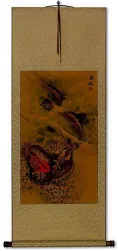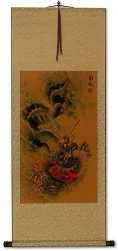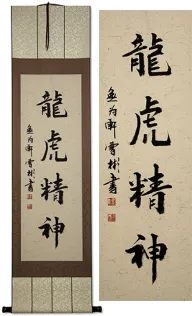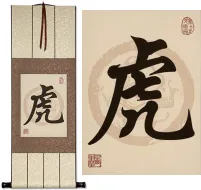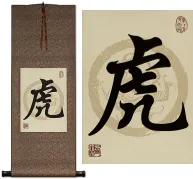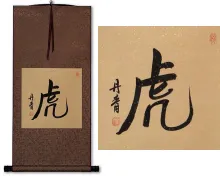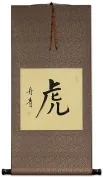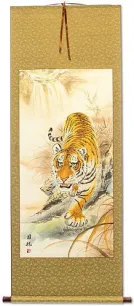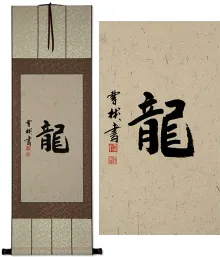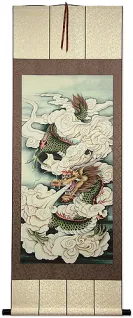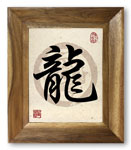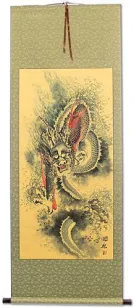Many custom options...
And formats...

Crouching Tiger Hidden Dragon in Chinese / Japanese...
Buy a Crouching Tiger Hidden Dragon calligraphy wall scroll here!
Personalize your custom “Crouching Tiger Hidden Dragon” project by clicking the button next to your favorite “Crouching Tiger Hidden Dragon” title below...
Crouching Tiger Hidden Dragon
臥虎藏龍 is the movie title of the Kung Fu epic that was very popular in the west a few years back.
This is a re-ordering of an ancient Chinese proverb that refers to undiscovered talents.
The movie was one of the most popular Chinese foreign films to ever debut in the USA but received a lukewarm reception in China.
Note: This can be pronounced in Korean, but it's not a commonly used term.
Hidden Dragon Crouching Tiger
Undiscovered persons of exceptional ability
The meaning of 藏龍臥虎 is that both the tiger and dragon have amazing talents, but if they are out of view, you may not have discovered them.
This old Chinese idiom/proverb is appropriate for someone with an amazing ability that keeps that ability hidden.
You might think this title is in reverse, but actually, this is the original Chinese proverb.
The movie Crouching Tiger, Hidden Dragon, popularized this alternate version.
This in-stock artwork might be what you are looking for, and ships right away...
Gallery Price: $200.00
Your Price: $99.88
Gallery Price: $40.00
Your Price: $16.88
Gallery Price: $65.00
Your Price: $39.88
Gallery Price: $65.00
Your Price: $39.88
Gallery Price: $106.00
Your Price: $58.88
Not the results for crouching tiger hidden dragon that you were looking for?
Below are some entries from our dictionary that may match your crouching tiger hidden dragon search...
| Characters If shown, 2nd row is Simp. Chinese |
Pronunciation Romanization |
Simple Dictionary Definition |
李安 see styles |
lǐ ān li3 an1 li an |
More info & calligraphy: Leeann |
臥虎藏龍 卧虎藏龙 see styles |
wò hǔ cáng lóng wo4 hu3 cang2 long2 wo hu ts`ang lung wo hu tsang lung |
More info & calligraphy: Crouching Tiger Hidden Dragon |
藏龍臥虎 藏龙卧虎 see styles |
cáng lóng wò hǔ cang2 long2 wo4 hu3 ts`ang lung wo hu tsang lung wo hu |
More info & calligraphy: Hidden Dragon Crouching Tiger |
The following table may be helpful for those studying Chinese or Japanese...
| Title | Characters | Romaji (Romanized Japanese) | Various forms of Romanized Chinese | |
| Crouching Tiger Hidden Dragon | 臥虎藏龍 卧虎藏龙 | wò hǔ cáng lóng wo4 hu3 cang2 long2 wo hu cang long wohucanglong | wo hu ts`ang lung wohutsanglung wo hu tsang lung |
|
| Hidden Dragon Crouching Tiger | 藏龍臥虎 藏龙卧虎 | cáng lóng wò hǔ cang2 long2 wo4 hu3 cang long wo hu canglongwohu | ts`ang lung wo hu tsanglungwohu tsang lung wo hu |
|
| In some entries above you will see that characters have different versions above and below a line. In these cases, the characters above the line are Traditional Chinese, while the ones below are Simplified Chinese. | ||||
Successful Chinese Character and Japanese Kanji calligraphy searches within the last few hours...


